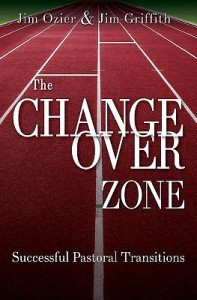In a relay race, there is an “incoming” and an “outgoing” runner. At different times, and in different races, runners must play either part. So it is in pastoral transitions. At various times in a typical ministry career, any given pastor will either be handing off the baton or receiving the baton. Pastoral leadership requires competency in both roles.
In the relay race, the incoming sprinter carries the baton and hands it off to the outgoing runner in the changeover zone. Who carries the baton in the pastoral transition? The outgoing pastor! He or she must grasp it firmly, charge full speed into the changeover zone, set aside ego, and realize that if the baton is dropped or the transition is poorly executed, it hurts everyone. Exiting pastors must come into the changeover zone with a 100 percent commitment to success in passing the baton! They will enthusiastically put in the time, work, and effort to make it a smooth and seamless handoff.
At various times in a typical ministry career, any given pastor will either be handing off the baton or receiving the baton. Pastoral leadership requires competency in both roles.
The daunting reality is that, most of the time, pastors in the changeover zone are saying “goodbye” and “hello” simultaneously. Unless the outgoing pastor is retiring or otherwise leaving pastoral ministry, that pastor is at the same time preparing for a new church and learning about a new congregation, culture, and ministry setting. Time demands, attention, and focus are stretched during this pressure-filled juggling act. Fortunately, this relay race is a sprint, and not a marathon.
If you are an outgoing pastor entering into the changeover zone, these five specific behaviors can increase your chances for success:
Engage
Engage the congregation in both a personal and professional way. Personalize the transition and make it real. Own the situation, but never blame the transition on external forces. Be honest and positive about your approval of the change. People in the pews are used to job changes. Draw on that common experience in a positive way, saying things like: “What I’ll be doing next…,” “What I learned here that I’ll take with me…,” “What you folks taught me…”
Professionalize the transition the way anyone in the congregation would want to see in their career life. Like the runner charging into the changeover zone, charge into your concluding days with intentionality and gusto. Make sure loose ends are tied up and records and statistical data are in order. Attend to ministry projects so that things won’t drop through the cracks.
Enrich
This is a great teaching moment about how pastoral changes are made within your polity. It’s not a time to apologize for it, or blame it. Continue to cast vision for the church’s future under new leadership as you pass the baton. This enrichment function must be done publicly in your closing sermons, Bible studies, and meetings, as well as in personal conversations and other settings.
Endear
Endear the congregation to the new pastor. In your role as the exiting pastor, you can do this better than anyone else. Provide as many personal introductions of your successor as possible, in as many ways as possible. For instance, appear with your successor in introductory videos to be shown during worship and at church meetings and gatherings. Make them creative, funny, interesting, and compelling. Many churches use simple techniques like “Five Fun Facts” or “Two Truths and a Lie” in morning worship for three or four Sundays leading up to the new pastor’s arrival. As the master of ceremonies for this brief, fun, interactive time, you should take every opportunity to brag on your successor. Personally escort your successor on a tour of the community and to meet key leaders. Take “selfies” with the new pastor along the way to show on screens, post on YouTube, and include in written communications.
Encourage
Acknowledge that there will be some natural stress and anxiety as the church enters the changeover zone. Encourage people to love your successor in the same way they loved you. Encourage them to meet the challenges of the future, to continue vital ministries and to start new ones. Organize some especially hospitable folks to put together welcome baskets filled with coupons, movie tickets, and other small gestures of greeting to ease your successor’s arrival.
End
Bring to a close your relationships with parishioners. This can be painful for all, including you. But it must be done. Do this within the context of worship, and in all personal and public settings. Honor and respect the friendships you’ve made, but also be mindful of how you have to end the current dynamic of relationships to help your successor get off to a good running start!
This article is adapted from Jim Ozier’s book that he co-authored with Jim Griffith, The Changeover Zone: Successful Pastoral Transitions (Abingdon, 2016) and is used with permission. The Changeover Zone is available at Cokesbury and Amazon.
Jim Ozier’s book that he co-authored with Jim Griffith, The Changeover Zone: Successful Pastoral Transitions (Abingdon, 2016) and is used with permission. The Changeover Zone is available at Cokesbury and Amazon.
Related Resources:
- How Incoming Pastors can Navigate the Changover Zone by Jim Ozier
- Social Media and Pastoral Moves by Thomas G. James and Lovett H. Weems, Jr.
- 50 Ways to Welcome a New Pastor
- The Right Start Resource







